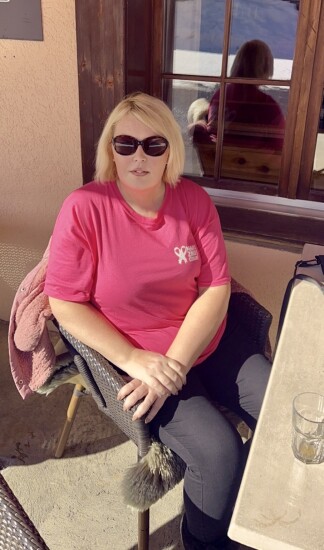7th May 2025 by Finlay Samson

Living with secondary breast cancer can be emotionally and physically draining. Symptoms present a unique set of challenges that members of our community have to tackle on a daily basis. Insomnia is a global health issue thought to affect 1 in 3 adults in the UK and 40% of people with primary breast cancer.
There is currently a lack of support available for people living with secondary breast cancer who suffer from insomnia, but a new research project that we have invested called ESTABLISH (Exploring Suitable Treatments for Advanced Breast cancer patients with Long-term Insomnia through StakeHolder collaboration), hopes to change that.
Mandy from Pembrokeshire, shares her experience of living with insomnia and the impact this study could make.
How has insomnia affected your ability to function day-to-day?
Insomnia has massively increased my daily fatigue. It’s not unusual for me to fall asleep in the day time. It has caused me to have poor concentration and significant memory issues. I never used to forget things but now I do almost daily. I struggle to get the right words when talking sometimes.
It affects my mood, impairs my ability to function day to day. I also believe it contributes to my immune system being weak and therefore increased health issues and reoccurring infections.
It also stops me attending social events, trips, family activities etc reducing my quality of life. At times it has impacted my ability to drive so I have had to cancel trips as I did not feel safe enough to drive.
When I was working I felt that the significant insomnia contributed to me struggling to be able to do my job and forced me to retire before I really wanted to.
Insomnia also affected my mood, I was grumpy and on occasion short tempered which is very unusual for me.
Did you suffer from insomnia prior to your primary and/or secondary breast cancer diagnosis?
Yes, I did but not like I do now. I suffer with fibromyalgia and poor sleep was only something I experienced when I was having flare ups.
How has insomnia impacted your secondary breast cancer journey?
I struggle to manage my day to day activities, like remembering appointments, to think clearly, as well as my ability to make important decisions about my health. sometimes insomnia has made me so tired and fatigued that I have had to miss health appointments and treatment. I believe it contributed to my ability to heal properly after my mastectomy surgery.
I also believe it has at times heightened my emotional distress when dealing with anxiety linked to results, diagnosis etc. It most definitely increases my pain tolerance.
Do you feel that there is support available to help you treat your insomnia?
There is support and resources available but only because I have searched for it myself. I have frequently mentioned my insomnia to my health professionals but have never been offered any support or help. I feel that it is not considered important enough compared to my cancer diagnosis and relating health issues and no one takes responsibility for supporting me with it,
What changes do you think can be made, if any, to help people with secondary breast cancer who are suffering from insomnia?
Firstly it would be really helpful if medical professionals actually listened to their patients who reported that they are experiencing insomnia!
I imagine it’s a bigger problem than people think. Wellbeing assessments that include questions such as insomnia should be carried out regularly to enable patients to report concerns, worries or symptoms that are related to their condition/ diagnosis especially ones that can significantly impact an individual.
If everyone had access to a secondary breast cancer nurse then issues like insomnia could be discussed, supported and managed by them. They could act as a key worker in giving patients information, signposting to relevant information/ resources and liaising with your medical team.
Information regarding insomnia and strategies on how to manage it or prevent it could be made into a booklet and given at appointments with the appropriate medical professional or provided by cancer charities. Leaflets or booklets/ workshops on how to establish a good sleep routine, ways to promote relaxing bedtime routines, ways to improve your sleep environment, advice on diet, hydration, caffeine, exercise, stress management, screen time etc could be made available to those asking for help with insomnia.
Advice on sleep aids and possible remedies or medications could also be discussed with the secondary breast cancer nurse.
Have you been offered any solutions or treatments for your insomnia?
I have been offered no advice, solutions or treatments for my insomnia from anyone apart from my GP who once advised I establish a good sleep routine. But was given no information on what that entails!! So not much help! Which is why I researched for information and found it myself. When living with metastatic breast cancer we shouldn’t have to fight so hard for support with something like insomnia that impacts so much of our lives, we have enough on our plate.
Make 2nds Count are supporting the ESTABLISH trial, which aims to investigate the impact of insomnia on people living with secondary breast cancer and trial tailored Cognitive Behaviour Therapy (CBT) as a potential solution to insomnia. If proven effective, it could potentially fill a great unmet need for support in this area.
The first step of this trial is to survey our community on sleep and insomnia. Please take part in the survey by clicking here: ESTABLISH Insomnia Survey